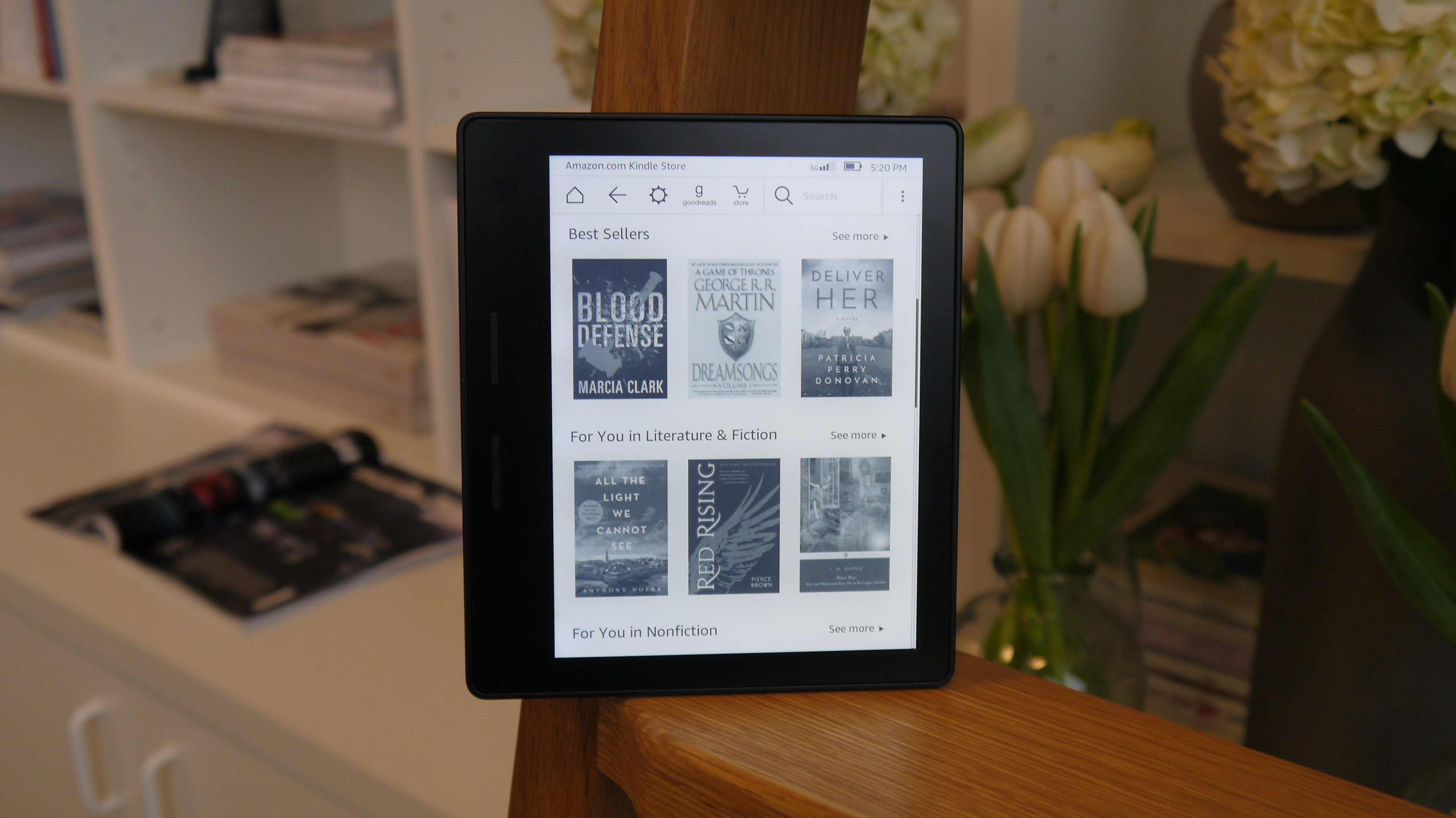TechRadar Verdict
The Amazon Kindle Oasis is the best experience money can buy when it comes to reading electronic tomes. The main problem lies in how much money you have to part with to let that happen, and its high price is likely to scare some off.
Pros
- +
Innovative new design
- +
Great new back-lit screen
- +
Vast selection of ebooks
Cons
- -
Shorter battery life
- -
Most expensive Kindle ever
- -
Only leather case options
Why you can trust TechRadar
Update: This review is for the first generation Amazon Kindle Oasis that was released in 2016 and is now very difficult to find on sale. There's now the more recent Amazon Kindle Oasis (2017) that you'll find on sale from Amazon and a variety of other retailers.
Amazon's Kindle range hasn't seen an innovation like the Oasis since 2014, when the Kindle Voyage appeared.
Ever since the original Amazon Kindle hit the virtual shelves back in November 2007 the company has managed to refine the design with each passing generation, nipping here and tucking there to make it one of the best-looking ereaders around.
What this latest Kindle shows is that Amazon has struggled to refine the device any further in its current form: the Kindle Oasis heralds a time for change.
The new ereader sits at the top of the Kindle hierarchy as the highest-priced ereader so far – it's even more expensive than the Kindle Voyage, which was itself criticised for being too pricey.
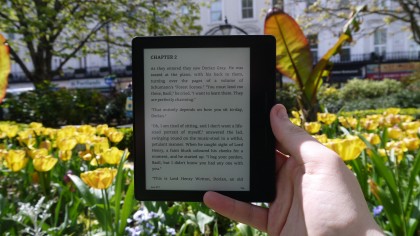
The Kindle Oasis costs a whopping $289.99 (£269.99, about AU$425), which at first glance seems like way too much money to spend on a device you can only read ebooks on.
But if you're an avid reader, then arguably it's worth getting the best possible experience from your ebook collection.
If you want the 3G version you'll need to shell out even more: $359.99 (£329.99, about AU$520); and if you're in the US you'll also need to spend an additional $20 to get rid of adverts.
That's a lot of money for prospective purchasers – and Amazon, and the Kindle range, need a win right now. Figures from Pew Research have revealed that ereader ownership has dropped from 32% in 2014 to 19% in 2015. That means that a lot of people who have previously bought ereaders have left them behind for alternatives, or the traditional printed word.
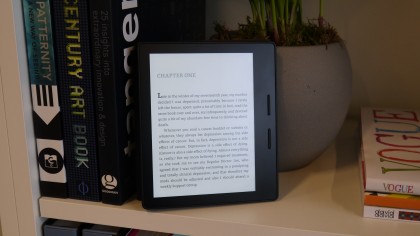
How does a company like Amazon generate sales of a product people aren't as interested in any more?
Much as the iPad Pro 9.7 has been used to spur tablet sales for Apple, Amazon is looking towards the high-end market to boost Kindle sales once again; to reKindle them, if you will.
Amazon has assured me that the Oasis isn't just for those who have owned a Kindle previously; the aim here is to entice new customers who haven't experienced ebooks before. But if you haven't read books on a screen before, are you really going to spend the best part of $300 to find out what it's like?
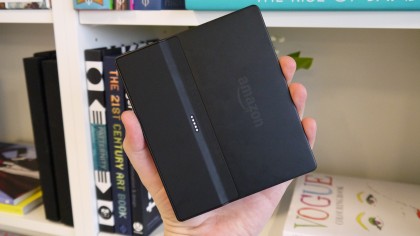
Amazon wants to offer the best possible reading experience in the Kindle Oasis, and it's designed for those who don't mind how much they spend on it.
Whether you're an avid ereader fan looking to upgrade, or a traditional reader who's thinking of dipping their toes in the e-ink and can afford the best experience out there, the Kindle Oasis is aimed at you. But is it worth all that cash?
Design
The design of the Oasis is radically different to that of the last few Kindles, and I was assured by a Kindle rep that this is the next step toward Amazon's future vision of an ereader.
The company eventually wants to create a device that acts just like a sheet of paper, and this is certainly the closest it's got to this ambition becoming a reality. Even though the Kindle Oasis is thicker than a single sheet, it's by far the most comfortable ereader you can buy right now.
There are three key elements in the Kindle Oasis: the screen, the battery and the processing unit. These are all contained in a metal case which is covered with a plastic body.
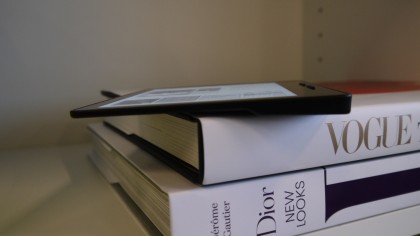
Amazon has slimmed everything down to the smallest-possible form factor. If you're looking for something that feels entirely different to a traditional Kindle, this won't disappoint.
For one thing, one side of the Kindle Oasis is drastically thinner than the other. At its thinnest point it's 3.6mm, and while the other end is slightly thicker it's still thinner than all the other Kindles.
The thick side is designed for gripping the device, while the thinner and lighter side enables the device to feel comfortable and well balanced in the hand.
I found the Oasis easier to hold than other ereaders, and it was noticeably more comfortable to use for extended periods on my commute than other Kindles I've used.
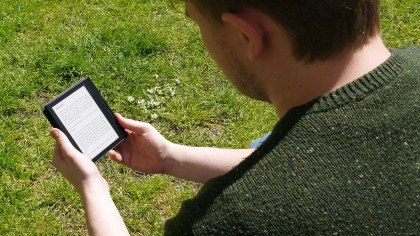
On the front of the device are two buttons that you can press to flick through pages; you can also tap the display, as on other Kindles. The buttons come in useful when reading one-handed, as you can hit them with your thumb without having to shuffle the device around in your hand.
In my time with the Kindle Oasis I've found myself using the buttons rather than the touchscreen controls. Flipping pages with the touchscreen isn't always reactive, and there's something satisfying about pressing a physical button to turn the page.
If you're left-handed, you're covered here too. You can just flip the device the other way round and the screen will follow suit. From there you can use your dominant hand for grip and page flicking.
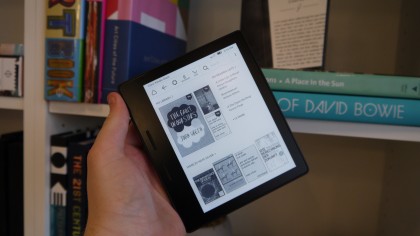
The only issue here is that the power button and micro USB charging slot will now sit at the bottom of the device rather than at the top, although you won't be constantly using those.
There's a plastic grip on the side you'll be holding with your fingertips, which doesn't look as premium as I'd have liked at this price. The other side features the Amazon logo emblazoned on the back and was a bit of a fingerprint magnet, but fortunately you won't be touching this much unless you use the device two-handed.
On the grip section there's a connector for Amazon's new range of cases, one of which comes in the box. It's a flip case to cover the top of your Kindle, but it also houses a larger battery which sits against the thinner side of the Oasis, making the device even thicker than the rest of the Kindle range.
James is the Editor-in-Chief at Android Police. Previously, he was Senior Phones Editor for TechRadar, and he has covered smartphones and the mobile space for the best part of a decade bringing you news on all the big announcements from top manufacturers making mobile phones and other portable gadgets. James is often testing out and reviewing the latest and greatest mobile phones, smartwatches, tablets, virtual reality headsets, fitness trackers and more. He once fell over.
